
The corn snake is a species of North American rat snake in the family Colubridae. The species subdues its small prey by constriction. It is found throughout the southeastern and central United States. Though superficially resembling the venomous copperhead and often killed as a result of this mistaken identity, the corn snake lacks functional venom and is harmless. The corn snake is beneficial to humans because it helps to control populations of wild rodent pests that damage crops and spread disease.

Pantherophis obsoletus, also known commonly as the western rat snake, black rat snake, pilot black snake, or simply black snake, is a nonvenomous species of snake in the family Colubridae. The species is native to central North America. There are no subspecies that are recognized as being valid. Its color variations include the Texas rat snake. Along with other snakes of the eastern United States, like the eastern indigo snake and the eastern racer, it is called “black snake”.
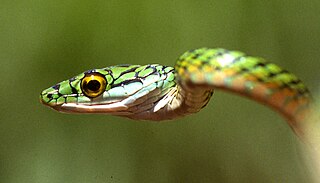
Leptophis ahaetulla, commonly known as the lora or parrot snake, is a species of medium-sized slender snake of the family Colubridae. It is endemic to Central America and northern South America.

Erythrolamprus cobella, commonly known as the mangrove snake, is a species of small semi-aquatic snake, which is endemic to South America.

The Aesculapian snake, is a species of nonvenomous snake native to Europe, a member of the Colubrinae subfamily of the family Colubridae. Growing up to 2 metres (6.6 ft) in length, it is among the largest European snakes, similar in size to the four-lined snake and the Montpellier snake. The Aesculapian snake has been of cultural and historical significance for its role in ancient Greek, Roman and Illyrian mythology and derived symbolism.
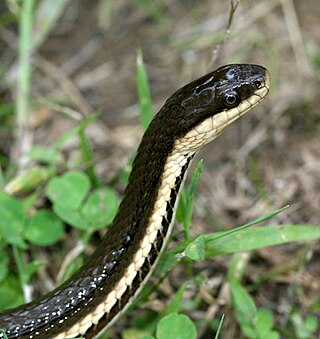
The queen snake is a species of nonvenomous semiaquatic snake, a member of the subfamily Natricinae of the family Colubridae. The species is endemic to North America.

The common trinket snake is a nonvenomous constrictor species of colubrid snake native to south Central Asia.
Elaphe hodgsoni, the Hodgson's rat snake, is a species of snake in the family Colubridae. The species is found in parts of Asia around the Himalayas.

Pantherophis vulpinus, commonly known as the foxsnake or the eastern fox snake, is a species of nonvenomous rat snake in the family Colubridae. The species is native to North America.
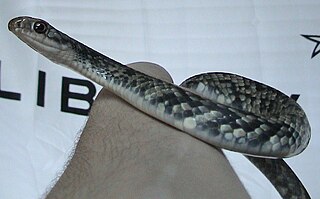
The eastern racer or North American racer is a species of nonvenomous snake in the family Colubridae. The species is endemic to North America and Central America. Eleven subspecies, including the nominotypical subspecies, are recognized, which as a group are commonly referred to as the eastern racers. The species is monotypic in the genus Coluber.
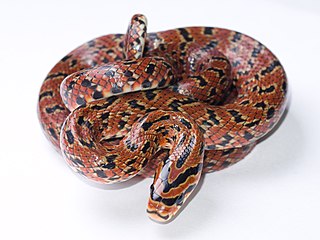
Euprepiophis conspicillata, commonly known as the Japanese forest rat snake, is a species of nonvenomous colubrid snake endemic to Japan. Its Japanese common name, jimuguri, roughly translates to "the burrower". It is closely related to Euprepiophis mandarinus, the Mandarin rat snake.

The ladder snake is a species of non-venomous snake in the family Colubridae. The species is endemic to southwestern Europe.

The European ratsnake or leopard snake, is a species of nonvenomous colubrid snake endemic to Europe, Asia Minor, and the Caucasus.

The crayfish snake, also known commonly as the glossy crayfish snake, the glossy swampsnake, the glossy water snake, and the striped water snake, is a species of semiaquatic snake in the subfamily Natricinae of the family Colubridae. The species is endemic to the southeastern United States, and preys mainly on crayfish.

The striped whipsnake is a species of nonvenomous snake in the family Colubridae. It is closely related to the California whipsnake. The striped whipsnake is native to the western United States and adjacent northern Mexico.

Elaphe quatuorlineata is a member of the family Colubridae. The four-lined snake is a non-venomous species and one of the largest of the European snakes.
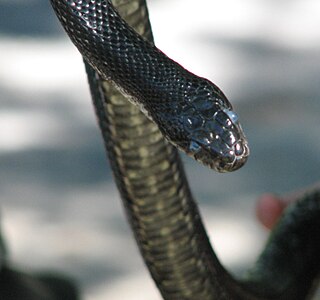
Pantherophis alleghaniensis, commonly called the eastern rat snake, is a species of nonvenomous snake in the family Colubridae. The species is endemic to North America.
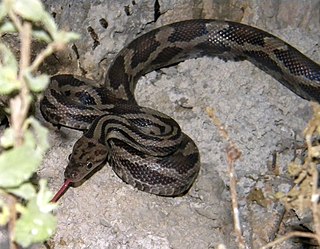
The yellow-red rat snake is a species of snake in the family Colubridae. The species is endemic to Mexico and Central America. Three subspecies are recognized.

Elaphe dione, commonly known as Dione's ratsnake, the steppe ratsnake, or the steppes ratsnake, is a species of snake in the family Colubridae. The species is native to Asia and Eastern Europe. There are no subspecies that are recognized as being valid.
Elaphe davidi is a species of snake in the family Colubridae. The species is endemic to East Asia.






















